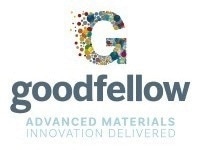Goodfellow Ceramic & Glass Division are an award-winning company who supply specialist glass and ceramics for scientific and industrial use.
Goodfellow Ceramic & Glass Division's aim is to understand your application and then supply the most appropriate materials or components to meet your needs. Our technical staff are qualified in glass technology and materials science and can, therefore, provide impartial advice and full technical support for your projects.
Applications of Glass Tubes in Panic Bolts
For many years glass tubes have been used in panic bolts to allow emergency exit from buildings. When the tube is broken, the bolt slides back automatically which releases the door. Despite this approach working for many years, the potentially dangerous debris left behind after use prompted one of our customers to consider a redesign. The problem this manufacturer had highlighted was that after training on how to use the bolts, during accidental or real use, the broken clear glass was difficult to see and dangerous to pick up from the floor.
Glass Material Selection for Panic Bolts
Goodfellow Ceramic and Glass Division was approached to help with selecting alternative materials. The task was to select a material which would be strong enough to hold the bolt in place, for example when the door is being shaken on the outside by a potential burglar, but weak enough to be broken by the metal hammer in an emergency.
Development of Ceramic Tube
Working with the customer and a ceramic manufacturer, we developed a ceramic tube which had the correct strength but broke with a blunt fracture edge. The new tube is white in colour, making it easier to see the broken pieces even in poorly lit areas and the blunt fracture edge made it much less hazardous to clear up the debris after use. The particular ceramic used has good screen printing characteristics, which allows the traditional ''Break Break Break'' message to be printed on to its surface.

Image courtesy of TG Products Ltd.
Problem solving with glass and ceramic, the Goodfellow way!
About Goodfellow

Goodfellow supplies metals, ceramics and other materials to meet the research, development and specialist production requirements of science and industry worldwide.
The Goodfellow group consists of four companies. The main administration, research laboratories and workshops are located at the Company's headquarters in Cambridge, England. The subsidiary offices in America, France and Germany provide an additional service.